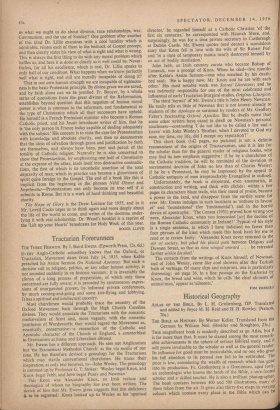Tr actanan Forerunners
THE THREE HERMITS. By J. Baird Ewens. (Epworth Press, 12s. 6d.) EVERY Anglo-Catholic schoolboy knows that the Oxford, or Tractarian, Movement dates from July 14, 1833, when Keble preached his Assize Sermon On National Apostasy. But such a decisive call in religion, politics, or any other human activity, is not sounded suddenly in an historic vacuum : it is invariably the climax of a long process of preparation, of which only those concerned are fully aware; it is preceded by spontaneous expres- sions of unorganised protest, by informal private conferences, by much coming-and-going and some kite-flying and lobbying. It has a spiritual and intellectual ancestry.
Most churchmen would probably trace the ancestry of the Oxford Movement back through the High Church Caroline divines. They would associate the Tractarians with the romantic medkevalism of Scott and, more vaguely, with the romantic pantheism of Wordsworth; they would regard the Movement as, essentially, conservative—a reassertion of the Catholic and Apostolic character of the Church of England, a counterblast to Erastianism at home and Liberalism abroad.
Mr. Ewens has a different approach. He sees not Anglicanism but 'the Ecumenical Methodist Church' as the via media of our time. He has therefore devised a genealogy for the Tractarians which may startle conventional churchmen. He traces their inspiration, at only two removes, to—John Wesley. The genealogy is summed up by Professor G. T. Stokes : 'Wesley begat Knox, and Knox begat Jebb, and Jebb begat Pusey and Newman.'
This Knox was Alexander Knox, an Irish recluse and theologian of whom no biography has ever been written. The sketch of him that Mr. Ewens gives suggests that this deficiency is to be regretted: Knox looked up to Wesley as his 'spiritual director,' he regarded himself as a Catholic Christian 'of the first six centuries,' he corresponded with Hannah More, and, surprisingly, he was for a time private secretary to Castlereagh at Dublin Castle. Mr. Ewens quotes (and denies) a scandalous story that Knox fell in love with the wife of Sir Robert Peel and 'in a state of temporary mania nearly destroyed himself by an act of bodily mutilation.'
John Jebb, an Irish country curate who became Bishop of Limerick, was a protégé of Knox. When he died—five months after Keble's Assize Sermon—one who watched by his death- bed said: 'He is happy now. Mr. Knox and he are with each other.' His most notable work was Sacred Literature; and he was indirectly responsible for one of the most celebrated and influential of early Tractarian liturgical studies, Origines Liturgiac.
The third 'hermit' of Mr. Ewens's title is John Henry Newman. He really tells us little of Newman that is not known already to students of the Apologia or surmised by readers of Mr. Geoffrey Faber's fascinating Oxford Apostles. But he dwells more than some other writers have cared to dwell on Newman's personal touchiness—contrasting 'I do not like to be called a liar and a knave' with John Wesley's 'Brother, when I devoted to God my ease, my time, my life, did I except my reputation?'
This short book (142 pages, no pictures) is not a definite reassessment of the origins of Tractarianism, and it is less for the scholar than for the general reader of religious books, who may find its new emphasis suggestive: if he be a churchman of the Catholic tradition, he will be reminded of the devotion to sacramental doctrine of John no less than of Charles Wesley; if he be a Protestant, he may be impressed by the appeal to Catholic antiquity of men irreproachably Evangelical in outlook.
Unfortunately, the book is disjointed, even amateurish, in construction and writing, and thick with cliches: within a few pages its characters blaze trails, win their meed of praise, become a power in the land, and disappear from the earthly scene for ever. Mr. Ewens indulges in such locutions as 'enthuse in favour ,of' and 'foundational' (for 'fundamental'), and in the horrid device of apostrophe: 'The Census (1951) proved how wrong you were, Alexander Knox, when you forecasted [sic] the decline of the Roman Catholic community in Ireland!' Typical of his style is a single sentence, in which I have italicised no fewer than four phrases of the kind which made this book hard for me to read or to review fairly : 'Alexander Knox never returned to the stir of society, but plied his placid path between Delgany and Dawson Street, so that as time winged onward . . . he retreated farther within his shell.'
The extracts from the writings of Knox himself, of Newman, and of John Wesley, come like cool showers after this Turkish bath of verbiage. Of many slips and misprints, one is particularly distressing : on page 36, in a fine pasiage on the Eucharist by Knox, the bread and wine, which he calls 'the chief aliments of animal man,' appear as 'ailments.'
TOM DRIBERG










































 Previous page
Previous page